- Home
- Pam Weaver
Always in my Heart
Always in my Heart Read online
For Barrie Arthur Stainer
CONTENTS
PROLOGUE
CHAPTER 1
CHAPTER 2
CHAPTER 3
CHAPTER 4
CHAPTER 5
CHAPTER 6
CHAPTER 7
CHAPTER 8
CHAPTER 9
CHAPTER 10
CHAPTER 11
CHAPTER 12
CHAPTER 13
CHAPTER 14
CHAPTER 15
CHAPTER 16
CHAPTER 17
CHAPTER 18
CHAPTER 19
CHAPTER 20
CHAPTER 21
CHAPTER 22
CHAPTER 23
CHAPTER 24
CHAPTER 25
CHAPTER 26
CHAPTER 27
CHAPTER 28
CHAPTER 29
CHAPTER 30
CHAPTER 31
CHAPTER 32
CHAPTER 33
CHAPTER 34
CHAPTER 35
EPILOGUE
ACKNOWLEDGEMENTS
Blue Moon
Love Walked Right In
PROLOGUE
December 1938
The villagers huddled together round the graveside, struggling to keep their umbrellas from blowing inside out. The wind was so gusty it was hard to stay upright on the slippery grass between the gravestones. The vicar of St Margaret’s, Angmering, Rev. Thomas Palmer, did his best to ignore the rain as he recited the prayer of the committal, but it wasn’t easy with freezing water dripping down his neck and what little bit of hair he had in total disarray. Today was a day when he was glad that his retirement was imminent. Standing out in all weathers like this was for a much younger man. He had given fifteen years of his life to the people of this parish and it was time to hang up his cassock. Life was strange. Who would have thought that he would bury Elizabeth Oliver before her husband? Elizabeth, pretty, vivacious and still a young woman, had been a dutiful wife to Gilbert, even though he was so surly. Although not a church-goer, Elizabeth always had a cheery wave and a smile.
There weren’t that many mourners – just a handful of people, which was surprising because Elizabeth Oliver was only in her late twenties. She had been married for almost three years, and apart from meeting up with Marilyn now and again, she led a quiet life. She had died after falling into Patching Pond. It was a mystery why she was there so late in the afternoon, but Gilbert Oliver, her devoted husband, had tried desperately to save her. The police had ruled out foul play because she liked to collect holly in that area to make Christmas wreaths. She sold them door to door in the village and made them a nice little sum of money, something that a struggling farmer like Gilbert always welcomed. He was aware of the gossip. People said she had married him for his money and the farm, but he wept as he told anyone who cared to listen what a good wife she had been to him.
The pallbearers were preparing to lower the coffin as Rev. Palmer began the familiar words of committal.
‘We have but a short time to live. Like a flower we blossom and then wither; like a shadow we flee and never stay. In the midst of life we are in death—’
He was halted by a strangulated cry from among the mourners and Elizabeth’s husband pushed his way forward. Men lost their footing and women cried out in shocked surprise as he rushed past them, but before anyone could stop him, Gilbert Oliver staggered over the muddy mound of earth and threw himself across her coffin, sobbing loudly.
‘For God’s sake, put the soil over me as well. I can’t live without her. Oh, Elizabeth, my Elizabeth . . .’
CHAPTER 1
August 1939
As the bell on the shop door jangled, Florrie Jenkins turned round. She stood as she always stood, behind the counter of her newsagent shop in the heart of the East End of London, sorting the papers ready for the newspaper boys to begin their rounds.
‘Packet of Old Holborn, Florrie.’ The early customer was Len Greene, a regular on his way to work. They exchanged a quiet smile, but as she reached up, a sharp pain under her right breast almost took her breath away.
‘You all right, my lovely?’
‘Bone in me corsets,’ she quipped. ‘Took me unawares.’
Anyone else would have countered her frankness with a lewd remark, but not Len. She took his money and handed him his tobacco. They had known each other for years and she looked forward to him coming, but she had learned the art of suppressing her feelings for him.
‘Betty not in today?’ he asked as he waited for change.
‘She’ll be here later,’ said Florrie. ‘Seven-thirty is her start time.’
Len took his watch out of his pocket and shook it. ‘I must be early, then.’
‘You off to the docks?’ she asked as she closed the till. The question was superfluous. It was obvious to anyone that he was a dock worker. His work clothes, a cheap jacket with no buttons, were pulled together with a piece of string round his waist, and like all dockers, he had a big metal hook threaded through it. They used it to dig into the cargo sacks, which made it easier to move them around in the tight spaces on-board ship.
Up at five-thirty, like herself, Len was on his way to the wharf to join the other casual labourers waiting by the gates in the hope of being hired for the day. It was a precarious existence because there was no guarantee of work, and of course no work meant no money. They were hard men who lived a hard life, but Len Greene was better than most. Some, if they had nothing better to do, would spend all day drinking in the Huntingdon Arms or some other pub. Len would make his way up to the allotments on Freemason’s Road and spend his time more productively. Occasionally if he had a glut of produce, he’d bring it to the shop and she would sell it at a small profit for them both.
‘I heard there’s a boat load of West African groundnuts in the docks today,’ he said, taking his change, ‘and some Rhodesian tobacco.’
‘Then you should have waited until you got to work for your baccy,’ she joked.
‘Should have done,’ he chuckled, ‘but that stuff is too raw for my liking.’ He waved his Old Holborn in the air. ‘I like mine matured.’ Len touched the edge of his flat cap and turned to go. ‘I’d best be off. See you on Tuesday.’
Florrie frowned. ‘Tuesday?’
‘Tuesday evening,’ he said. ‘We’re getting the Anderson shelter, remember?’
‘Oh yes, of course,’ said Florrie. ‘How could I forget that!’
‘Tubby Wilcox and me have managed to borrow a coster barrow. We’ll be round at about seven o’clock and I’ll help you put it up next Saturday.’
‘Thanks, Len,’ she said, patting the back of her hair. ‘I appreciate that.’
The shelters had been available since February, but she had never managed to get one until now. People earning less than five pounds a week got them for free, but those who had to pay for them were left waiting. Florrie had paid her seven pounds way back in April and here they were on the brink of war and her little back yard was still empty. Not having a man about the house created another problem, but happily, Len and Tubby had offered to help her put it up. ‘See you Tuesday after work, then,’ she said.
The door closed and Florrie allowed herself a small smile. Len was a man of few words. At one time, there had been a possibility that they might have been more than friends, but as far as Florrie was concerned, it was impossible. She couldn’t bear the shame again. How could she tell Len the truth? It would be like Sid all over again, and, she told herself firmly, you can’t start a relationship on a lie. Even after all this time, she wished things could have been different, but there it was. She was still married and Len was still single.
Florrie could feel another cough coming on and did her best to suppress it
. Damned thing. She’d had it for ages now. Once upon a time, if she caught a cold, she’d have a miserable couple of days and it would be over and done with, but not this time. This was harsh and dry and it left her breathless. When would she shake the flippin’ thing off?
Florrie Jenkins was an attractive woman of thirty-eight, slim with light brown hair, which she curled along the nape of her neck and styled with a deep wave on the right side of her head. She wore little make-up – a dab of face powder and a light coating of rose-pink lipstick – but apart from her wedding ring, she wore no jewellery at all. A mother with fifteen-year-old twins, she made her living by running a newsagent-cum-tobacconist.
Alone again, she continued to pile the papers into their rounds. The piles weren’t large because her little corner shop didn’t have many customers who could afford to have their papers delivered. Most of the people who came into her shop were dock workers, labourers and gaffers, but because it was between Canning Town and the wharf, she had a steady passing trade. Florrie glanced at the front page of the Daily Sketch. She had little time to read anything more than the headlines, but it seemed that the papers were filled with the same old depressing stuff. She tutted to herself. After his trip to Munich last year, everybody had hoped that Prime Minister Neville Chamberlain had secured a lasting peace, but as her friend Betty said, ‘That old bugger in Germany seems to be hell-bent on taking over the whole bloomin’ world.’
Florrie had married Sid Jenkins in 1919. They began married life together living with her father. He had the downstairs rooms, while she and Sid lived upstairs. Her father was a sick man. He had never fully recovered from being gassed in the trenches and he had never really got over what happened to Florrie’s mother, but when the twins, Shirley and Tom, were born in 1924, her father adored them. Things might have been all right, but when they’d discovered a few years later that Tom wasn’t quite right, she’d been so upset she’d told her husband everything. He’d been appalled and after that, things were never the same.
By the time she’d moved here, in 1930, she was on her own with the twins, now six years old. By then, her father had died, but as luck would have it, during his final days on earth, he had inherited the shop and made a will leaving all his worldly goods to his only child, Florrie. It was the saving of them all.
She sighed. To go through one war was bad enough, but to face it for the second time in a lifetime seemed grossly unfair. According to the headlines, though, it looked as if Betty was right. Adolf Hitler was out to cause trouble, and even though it was a lovely warm August day, the gloomy threat of war hung like a black cloud over everybody’s lives once again.
The jangle of the doorbell interrupted her thoughts and the Harper boys, Mick and Joseph, came into the shop.
‘You’re early today, boys.’
‘We’re going on the Sunday-school outing, Mrs Jenkins,’ said Mick. ‘Got to be at the school by eight fifteen.’
‘We’re going on a coach,’ said Joseph in awed tones.
‘Are you indeed,’ said Florrie, heaving the bags full of papers off the counter. The effort made her start coughing again. She pressed her handkerchief to her mouth as the boys set out. Mick was already halfway towards the door with his bag of papers, but Joseph lingered. ‘Is your Shirley coming, Mrs Jenkins?’
Florrie tucked her handkerchief back up her sleeve and rubbed her ribs. ‘Are you going from Hallsville School?’ Although she’d stopped coughing, she had a terrible stitch in her side. The boy nodded. ‘Then yes, she is,’ she said, turning her back so that he didn’t see her wince with pain.
The boys hurried out of the shop and Florrie managed to pull herself together. The children were all going to Southend for the day and she was glad. Who knew what the poor little beggars faced if that damned Hitler had his way? She wasn’t going with them. Shirley would be helping the Sunday-school teachers with the little ones, and Tom . . . well, Tom would be happy enough if his sister was with him. With a reasonable proportion of her customers off on a beano, which was what the people around here called a trip to the seaside for the day, Florrie was going to make the most of it. She couldn’t afford to shut the shop – it was her only income – but Betty would be here before long, and Doreen was coming over later on for a natter and a cup of tea.
There was a short lull and then a few more customers came in. That’s how it was in the shop: nobody for a while, then a mad rush. Some passed the time of day or chatted, while others only grunted. Nevertheless, by the time the next lull came, she’d heard that little Molly Smith had chickenpox, Mrs Payne’s son, Charlie, had signed up for the merchant navy, and there was to be a jumble sale at St Luke’s next Saturday. Florrie glanced up at the clock. Ten past seven. As soon as Betty Carr arrived, she’d have to make sure Shirley and Tom were ready or they would be late.
Standing at the door, she called up the stairs and was pleased to hear Shirley was already up. ‘Get your breakfast and make some sandwiches for your lunch,’ she instructed.
‘Yes, Mum.’
About a quarter of an hour later, Betty bustled through the shop door. She was a well-built woman, homely, with her hair cut short and tightly permed. ‘Hello, darlin’,’ she said cheerfully. ‘Everything all right?’
Florrie nodded. ‘Fine,’ she said. ‘I just need to make sure the kids get off all right.’
Betty hung up her coat and made her way to the counter. She had worked in the shop with Florrie ever since their children were small. As a married woman, it was unusual for someone like her to be out to work, especially doing the long hours she put in, but her husband, Raymond, was in the merchant navy and at sea most of the time, and Betty hated being on her own. Of course, in the beginning, she was busy bringing up their son, but he had joined the navy at sixteen. She hadn’t liked the idea but compulsory conscription had started in April, so he would have had to have gone by now anyway.
Out in the kitchen, Shirley heard the murmur of voices and knew that Auntie Betty had arrived. Any minute now, her mother would take a break and come through, so she poured the boiling water into the teapot ready for her.
‘Mick Harper tells me you have to be at the school by eight fifteen,’ Florrie said as she walked through the door.
Shirley nodded as the two of them moved gingerly around each other to do what they needed to. Their property was small, but they had more room than most people in Canning Town. There were two bedrooms upstairs, and the one over the shop was quite spacious. She and her mother slept there, while her brother, Tom, had the back room, which was much smaller. Downstairs, there was a small stockroom at the rear of the shop and a passageway that led to the kitchen-cum-sitting room. In the scullery beyond, they had a copper, a single tap over the earthenware sink and a gas cooker. Outside, there was a lavvy and a rather dilapidated lean-to, where Florrie grew tomatoes in the summer months. The kitchen was heated by a range, which Shirley had to black-lead every Saturday morning. Studying her reflection in the mirror over the dresser, Shirley began taking the kirby grips out of her kiss curls.
‘Is your brother up?’ her mother asked. She was reaching for the teacups.
‘Having his wash,’ said Shirley.
Florrie sat in front of her steaming cup and took some money out of her purse. ‘This is a little something for you both, but I want you to look after it,’ she said, handing it to her daughter. ‘Get Tom an ice cream and let him have a ride or two in the funfair, but don’t give him the change. You know the bigger boys will only persuade him to give it to them.’
With a nod of her head, Shirley put the money into her pocket. ‘Thanks, Mum.’ She was grateful, and her mother had been generous, but she was tempted to have another go at her about doing a paper round. All she wanted was a bit of independence, and she could only have that if she had her own money. It was really galling that her mother wouldn’t let her earn something for herself.
‘Mum, I appreciate what you’ve given me, but if you would let me do a paper round,’ Shirley began,
‘you wouldn’t have to give me money.’
‘Oh, Shirley, we’ve been over this before,’ said Florrie with a sigh. ‘It’s not safe. They don’t call round here “Draughtboard Alley” for nothing. You never know who’s out there, and I dread to think what might happen to you, especially if there was paper-round money in your pocket.’
Shirley knew there was no malice in the nickname; after all, Canning Town was truly cosmopolitan. Being in such proximity to the docks meant that people from all over the world and every nationality roamed the streets: African, Asian, Chinese, French, Irish, West Indians . . . you name it, they were there. Most of them were fine, but of course there was always the risk of one bad apple in the barrel, and with whispered horror stories about white-slavers roaming the streets, her mother wasn’t taking any chances.
‘The boys have no problem,’ Shirley retorted.
‘The boys can take care of themselves.’
‘I can take care of myself too,’ Shirley insisted, but by the look on her mother’s face she already knew her entreaty was falling on deaf ears. It was so unfair. Look at all the times she’d protected Tom from the bigger boys. She’d been ferocious and had even built up a bit of a reputation. Nobody took the mickey out of Tom Jenkins when she was around. Not any more they didn’t.
Florrie coughed. Shirley turned to look at her, her luscious curls bouncing on her shoulders. ‘You really should go to the doctor again, Mum.’
‘I’ll be fine,’ Florrie smiled.
‘But you won’t, will you?’ said Shirley. ‘You always make me and Tom go when we’re not well, so why won’t you go and see if he can’t at least give you a cough mixture?’
‘If I still have it on Monday,’ said Florrie, ‘I’ll go.’
‘Promise?’
Her mother nodded reluctantly, and her brother, Tom, came out of the scullery looking clean and tidy. Florrie stood up and straightened his tie, and then he sat down in front of the bowl of porridge Shirley had put on the table.
‘Are we going to see any animals, Shirl?’
His sister scraped a little butter onto her toast. ‘It’s possible,’ she said. ‘There may be donkeys on the beach, or perhaps a photographer’s monkey on the prom.’

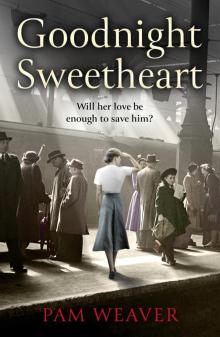 Goodnight Sweetheart
Goodnight Sweetheart At Home by the Sea
At Home by the Sea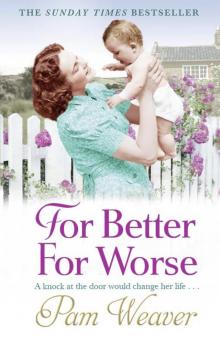 For Better For Worse
For Better For Worse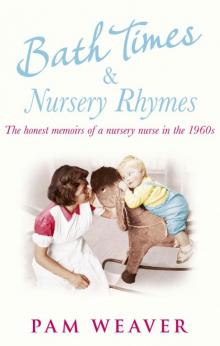 Bath Times and Nursery Rhymes
Bath Times and Nursery Rhymes Love Walked Right In
Love Walked Right In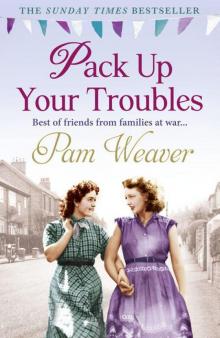 Pack Up Your Troubles
Pack Up Your Troubles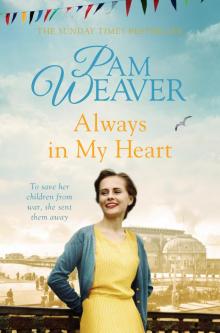 Always in my Heart
Always in my Heart Sing Them Home
Sing Them Home Amy's Seaside Secret
Amy's Seaside Secret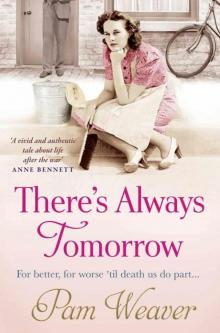 There’s Always Tomorrow
There’s Always Tomorrow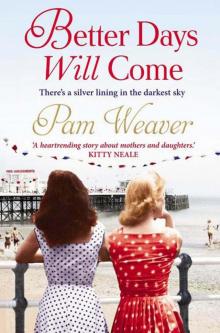 Better Days Will Come
Better Days Will Come Family Drama 4 E-Book Bundle
Family Drama 4 E-Book Bundle